Analysis of Mental Health Services for Elderly with Dementia, UK
VerifiedAdded on 2020/12/09
|38
|11806
|134
Report
AI Summary
This report delves into the critical area of mental health services for elderly individuals grappling with dementia. It begins with an abstract highlighting the prevalence and impact of dementia, particularly within the UK, emphasizing the urgent need for improved mental health support. The introduction outlines the research questions, aims, objectives, and significance of the study, setting the stage for a comprehensive analysis. The literature review explores mental health problems in the elderly, challenges within existing services, and knowledge gaps among caregivers. The methodology section describes the research design and method, which involves a systematic review based on the PRISMA model. The findings and analysis chapter presents the results of the review, discussing current practices and the problems faced by elderly patients in accessing mental health services. The conclusion summarizes the key findings, offers recommendations, and acknowledges the limitations of the study. Overall, the report aims to provide valuable insights into the current state of mental health services for elderly dementia patients, identify areas for improvement, and contribute to better care for this vulnerable population.
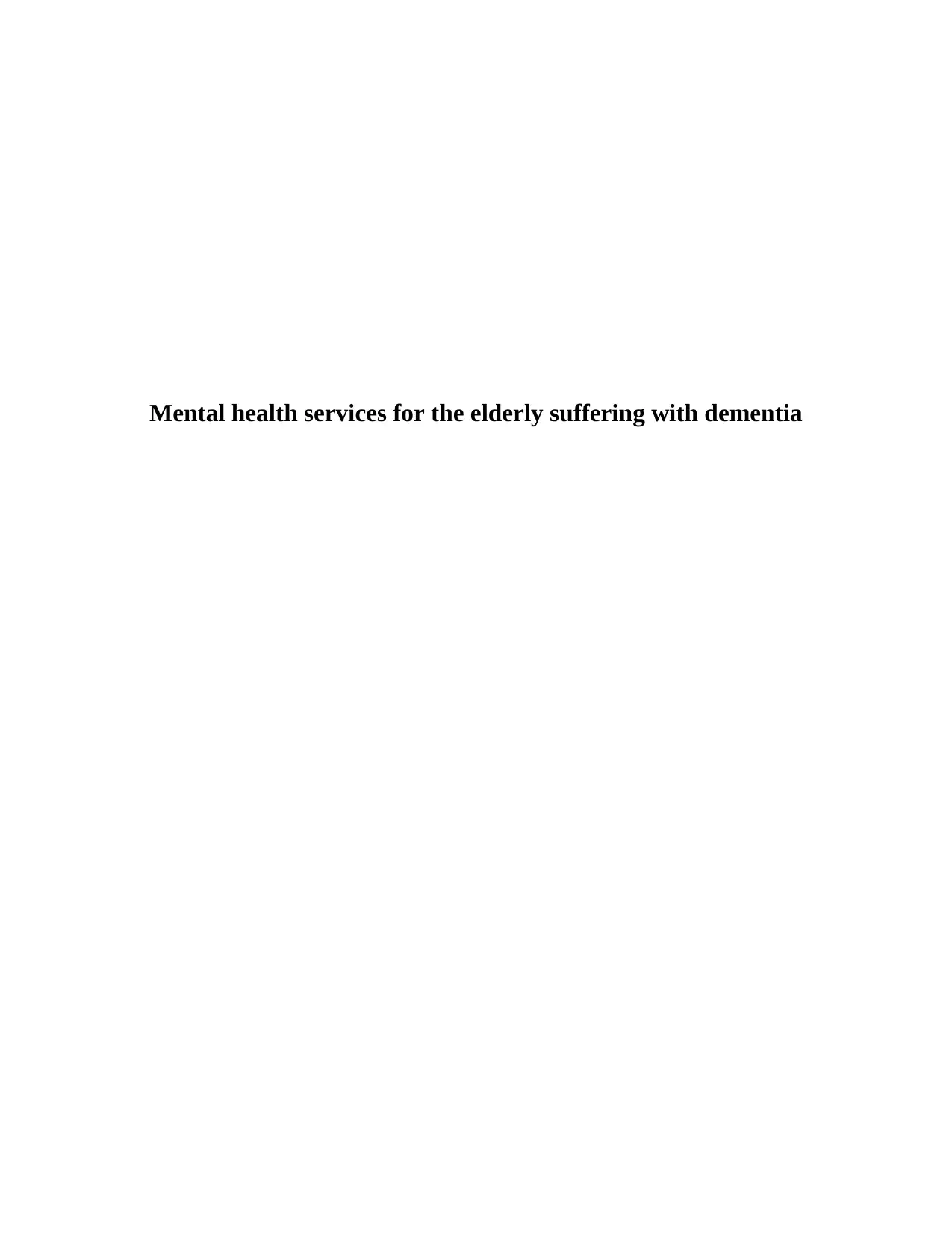
Mental health services for the elderly suffering with dementia
Paraphrase This Document
Need a fresh take? Get an instant paraphrase of this document with our AI Paraphraser
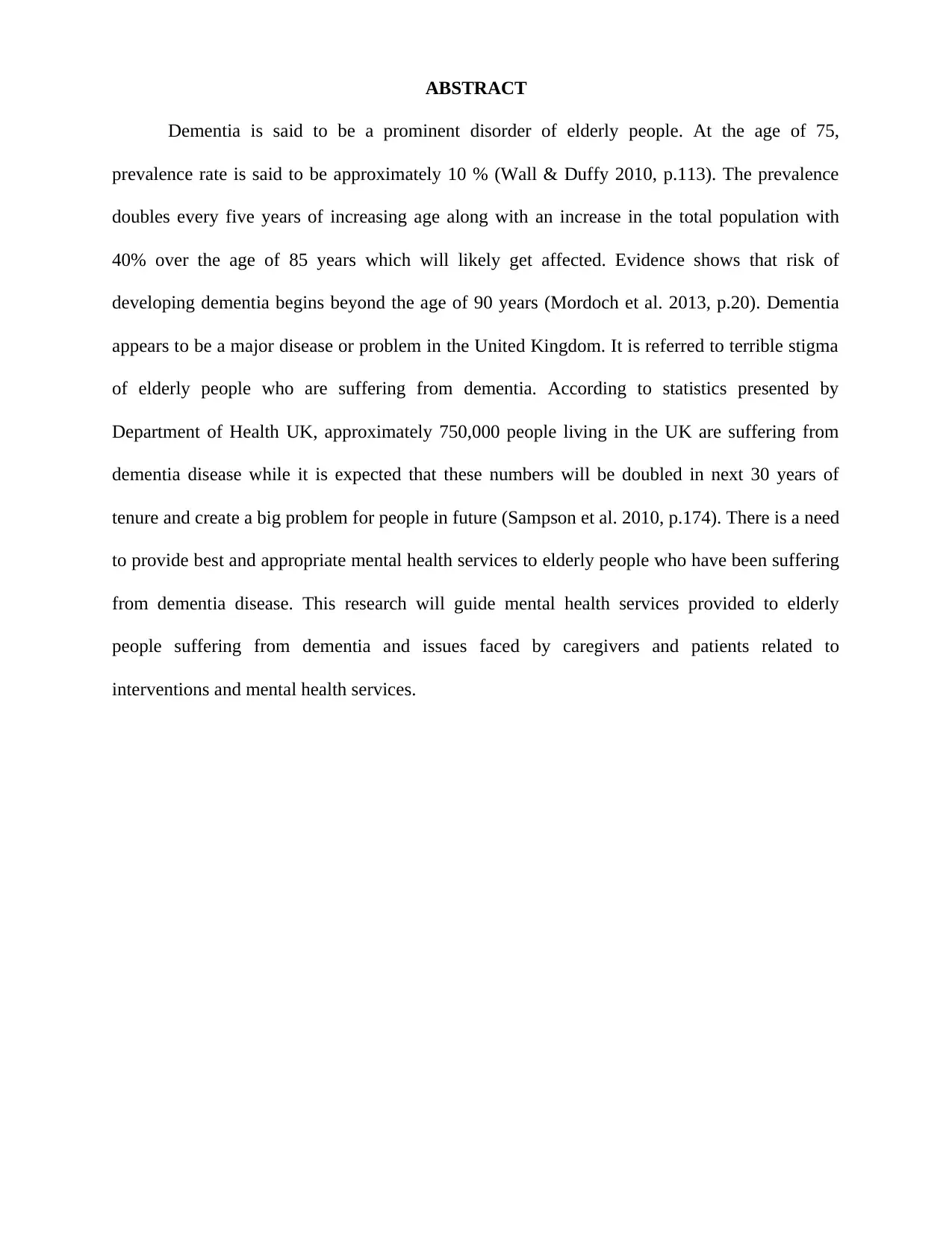
ABSTRACT
Dementia is said to be a prominent disorder of elderly people. At the age of 75,
prevalence rate is said to be approximately 10 % (Wall & Duffy 2010, p.113). The prevalence
doubles every five years of increasing age along with an increase in the total population with
40% over the age of 85 years which will likely get affected. Evidence shows that risk of
developing dementia begins beyond the age of 90 years (Mordoch et al. 2013, p.20). Dementia
appears to be a major disease or problem in the United Kingdom. It is referred to terrible stigma
of elderly people who are suffering from dementia. According to statistics presented by
Department of Health UK, approximately 750,000 people living in the UK are suffering from
dementia disease while it is expected that these numbers will be doubled in next 30 years of
tenure and create a big problem for people in future (Sampson et al. 2010, p.174). There is a need
to provide best and appropriate mental health services to elderly people who have been suffering
from dementia disease. This research will guide mental health services provided to elderly
people suffering from dementia and issues faced by caregivers and patients related to
interventions and mental health services.
Dementia is said to be a prominent disorder of elderly people. At the age of 75,
prevalence rate is said to be approximately 10 % (Wall & Duffy 2010, p.113). The prevalence
doubles every five years of increasing age along with an increase in the total population with
40% over the age of 85 years which will likely get affected. Evidence shows that risk of
developing dementia begins beyond the age of 90 years (Mordoch et al. 2013, p.20). Dementia
appears to be a major disease or problem in the United Kingdom. It is referred to terrible stigma
of elderly people who are suffering from dementia. According to statistics presented by
Department of Health UK, approximately 750,000 people living in the UK are suffering from
dementia disease while it is expected that these numbers will be doubled in next 30 years of
tenure and create a big problem for people in future (Sampson et al. 2010, p.174). There is a need
to provide best and appropriate mental health services to elderly people who have been suffering
from dementia disease. This research will guide mental health services provided to elderly
people suffering from dementia and issues faced by caregivers and patients related to
interventions and mental health services.

Contents
ABSTRACT....................................................................................................................................................2
CHAPTER I: INTRODUCTION.........................................................................................................................4
Background..............................................................................................................................................4
Research Questions.................................................................................................................................5
The research questions are......................................................................................................................5
Aims and Objectives................................................................................................................................5
Significance of Research..........................................................................................................................5
Outline of chapters..................................................................................................................................6
CHAPTER II: LITERATURE REVIEW................................................................................................................8
Mental health problems with elderly people..........................................................................................8
Issues with Existing Services for Dementia............................................................................................10
Mental Health Services .........................................................................................................................11
Knowledge gaps of care givers...............................................................................................................12
CHAPTER III: METHODOLOGY....................................................................................................................15
Research Design....................................................................................................................................15
Research Method..................................................................................................................................16
CHAPTER IV: ANALYSIS AND DISCUSSION..................................................................................................19
Results...................................................................................................................................................25
CHAPTER V: CONCLUSION.........................................................................................................................27
References.................................................................................................................................................31
Appendix....................................................................................................................................................35
Systematic Reviews...............................................................................................................................35
PRISMA chart.........................................................................................................................................37
ABSTRACT....................................................................................................................................................2
CHAPTER I: INTRODUCTION.........................................................................................................................4
Background..............................................................................................................................................4
Research Questions.................................................................................................................................5
The research questions are......................................................................................................................5
Aims and Objectives................................................................................................................................5
Significance of Research..........................................................................................................................5
Outline of chapters..................................................................................................................................6
CHAPTER II: LITERATURE REVIEW................................................................................................................8
Mental health problems with elderly people..........................................................................................8
Issues with Existing Services for Dementia............................................................................................10
Mental Health Services .........................................................................................................................11
Knowledge gaps of care givers...............................................................................................................12
CHAPTER III: METHODOLOGY....................................................................................................................15
Research Design....................................................................................................................................15
Research Method..................................................................................................................................16
CHAPTER IV: ANALYSIS AND DISCUSSION..................................................................................................19
Results...................................................................................................................................................25
CHAPTER V: CONCLUSION.........................................................................................................................27
References.................................................................................................................................................31
Appendix....................................................................................................................................................35
Systematic Reviews...............................................................................................................................35
PRISMA chart.........................................................................................................................................37
⊘ This is a preview!⊘
Do you want full access?
Subscribe today to unlock all pages.

Trusted by 1+ million students worldwide
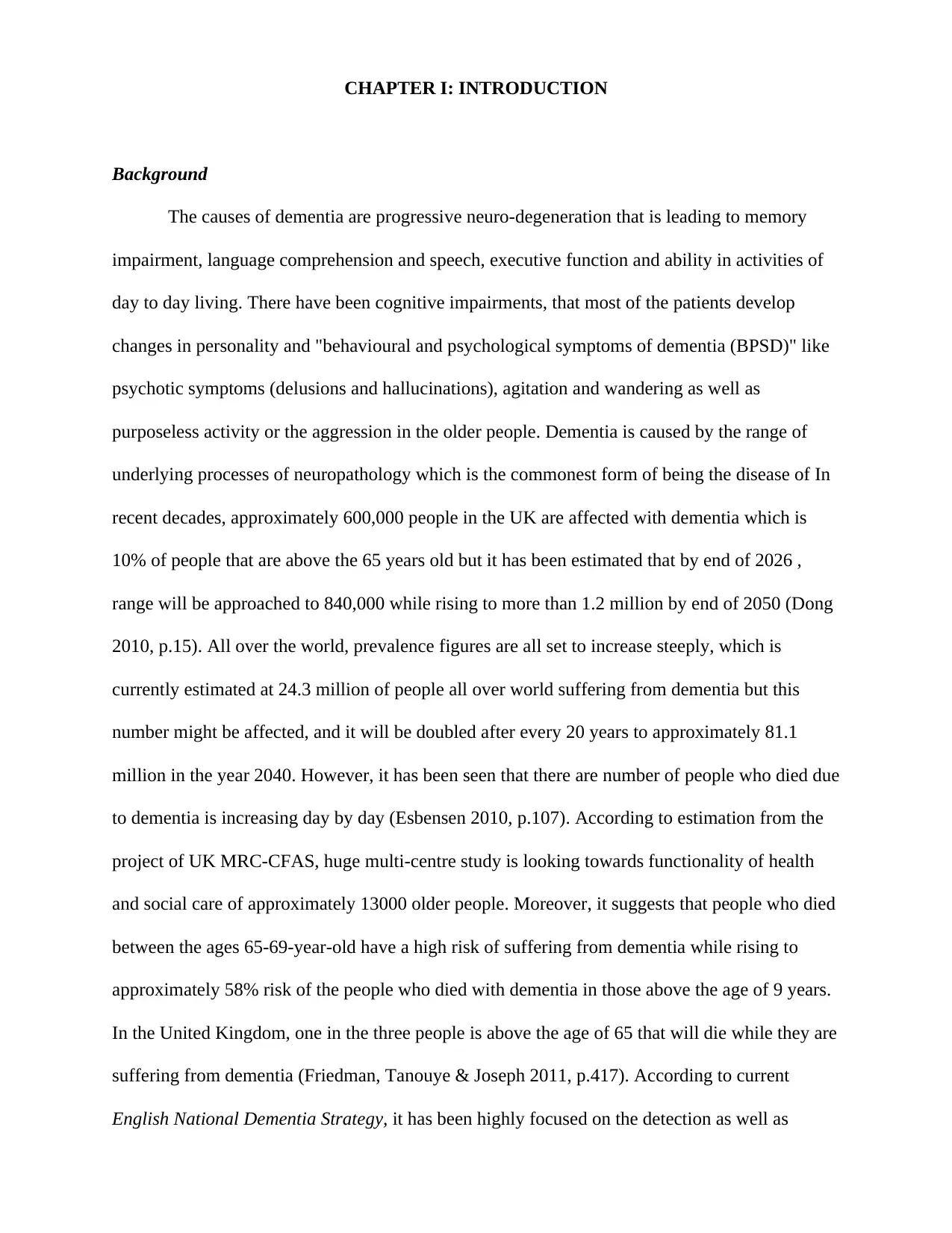
CHAPTER I: INTRODUCTION
Background
The causes of dementia are progressive neuro-degeneration that is leading to memory
impairment, language comprehension and speech, executive function and ability in activities of
day to day living. There have been cognitive impairments, that most of the patients develop
changes in personality and "behavioural and psychological symptoms of dementia (BPSD)" like
psychotic symptoms (delusions and hallucinations), agitation and wandering as well as
purposeless activity or the aggression in the older people. Dementia is caused by the range of
underlying processes of neuropathology which is the commonest form of being the disease of In
recent decades, approximately 600,000 people in the UK are affected with dementia which is
10% of people that are above the 65 years old but it has been estimated that by end of 2026 ,
range will be approached to 840,000 while rising to more than 1.2 million by end of 2050 (Dong
2010, p.15). All over the world, prevalence figures are all set to increase steeply, which is
currently estimated at 24.3 million of people all over world suffering from dementia but this
number might be affected, and it will be doubled after every 20 years to approximately 81.1
million in the year 2040. However, it has been seen that there are number of people who died due
to dementia is increasing day by day (Esbensen 2010, p.107). According to estimation from the
project of UK MRC-CFAS, huge multi-centre study is looking towards functionality of health
and social care of approximately 13000 older people. Moreover, it suggests that people who died
between the ages 65-69-year-old have a high risk of suffering from dementia while rising to
approximately 58% risk of the people who died with dementia in those above the age of 9 years.
In the United Kingdom, one in the three people is above the age of 65 that will die while they are
suffering from dementia (Friedman, Tanouye & Joseph 2011, p.417). According to current
English National Dementia Strategy, it has been highly focused on the detection as well as
Background
The causes of dementia are progressive neuro-degeneration that is leading to memory
impairment, language comprehension and speech, executive function and ability in activities of
day to day living. There have been cognitive impairments, that most of the patients develop
changes in personality and "behavioural and psychological symptoms of dementia (BPSD)" like
psychotic symptoms (delusions and hallucinations), agitation and wandering as well as
purposeless activity or the aggression in the older people. Dementia is caused by the range of
underlying processes of neuropathology which is the commonest form of being the disease of In
recent decades, approximately 600,000 people in the UK are affected with dementia which is
10% of people that are above the 65 years old but it has been estimated that by end of 2026 ,
range will be approached to 840,000 while rising to more than 1.2 million by end of 2050 (Dong
2010, p.15). All over the world, prevalence figures are all set to increase steeply, which is
currently estimated at 24.3 million of people all over world suffering from dementia but this
number might be affected, and it will be doubled after every 20 years to approximately 81.1
million in the year 2040. However, it has been seen that there are number of people who died due
to dementia is increasing day by day (Esbensen 2010, p.107). According to estimation from the
project of UK MRC-CFAS, huge multi-centre study is looking towards functionality of health
and social care of approximately 13000 older people. Moreover, it suggests that people who died
between the ages 65-69-year-old have a high risk of suffering from dementia while rising to
approximately 58% risk of the people who died with dementia in those above the age of 9 years.
In the United Kingdom, one in the three people is above the age of 65 that will die while they are
suffering from dementia (Friedman, Tanouye & Joseph 2011, p.417). According to current
English National Dementia Strategy, it has been highly focused on the detection as well as
Paraphrase This Document
Need a fresh take? Get an instant paraphrase of this document with our AI Paraphraser
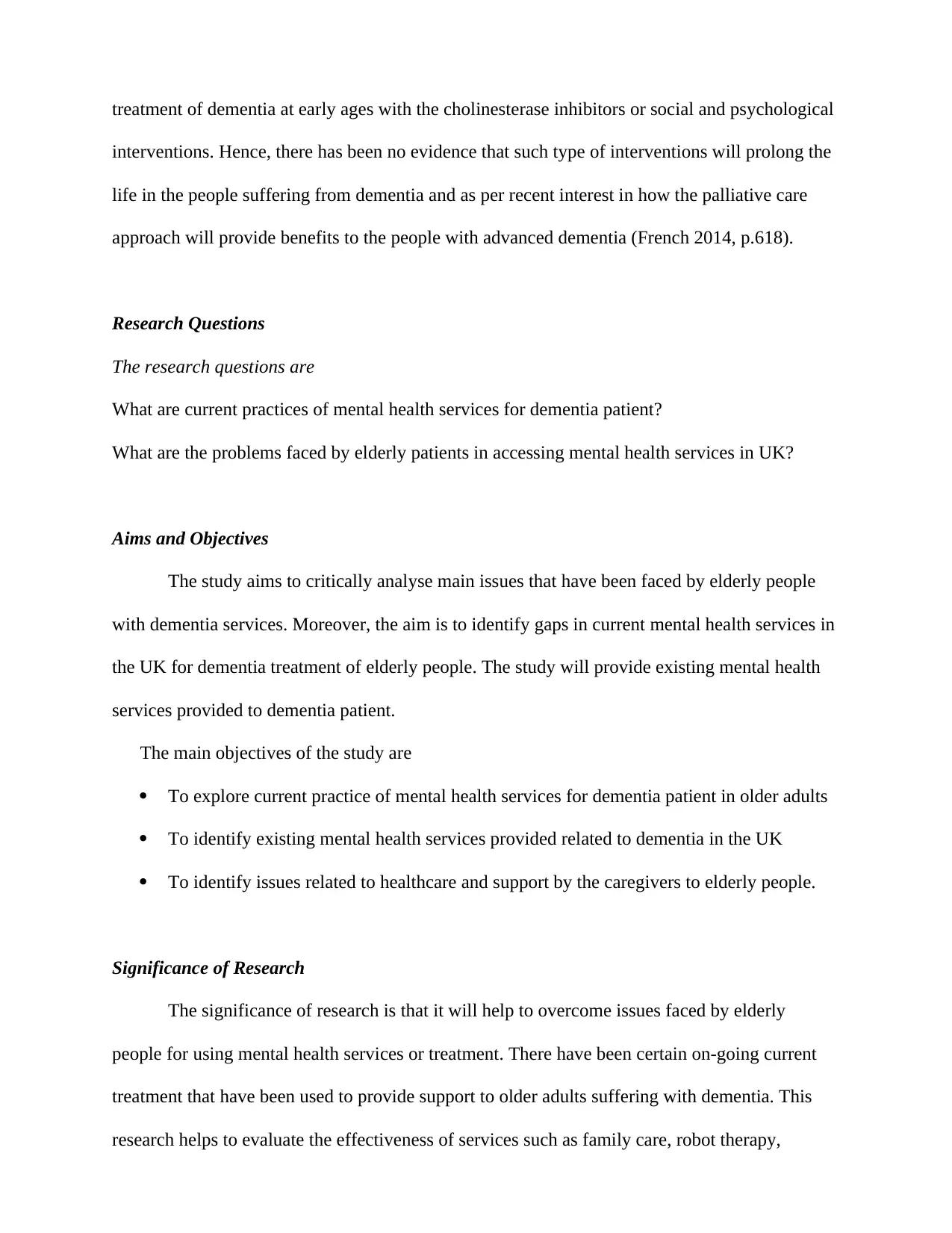
treatment of dementia at early ages with the cholinesterase inhibitors or social and psychological
interventions. Hence, there has been no evidence that such type of interventions will prolong the
life in the people suffering from dementia and as per recent interest in how the palliative care
approach will provide benefits to the people with advanced dementia (French 2014, p.618).
Research Questions
The research questions are
What are current practices of mental health services for dementia patient?
What are the problems faced by elderly patients in accessing mental health services in UK?
Aims and Objectives
The study aims to critically analyse main issues that have been faced by elderly people
with dementia services. Moreover, the aim is to identify gaps in current mental health services in
the UK for dementia treatment of elderly people. The study will provide existing mental health
services provided to dementia patient.
The main objectives of the study are
To explore current practice of mental health services for dementia patient in older adults
To identify existing mental health services provided related to dementia in the UK
To identify issues related to healthcare and support by the caregivers to elderly people.
Significance of Research
The significance of research is that it will help to overcome issues faced by elderly
people for using mental health services or treatment. There have been certain on-going current
treatment that have been used to provide support to older adults suffering with dementia. This
research helps to evaluate the effectiveness of services such as family care, robot therapy,
interventions. Hence, there has been no evidence that such type of interventions will prolong the
life in the people suffering from dementia and as per recent interest in how the palliative care
approach will provide benefits to the people with advanced dementia (French 2014, p.618).
Research Questions
The research questions are
What are current practices of mental health services for dementia patient?
What are the problems faced by elderly patients in accessing mental health services in UK?
Aims and Objectives
The study aims to critically analyse main issues that have been faced by elderly people
with dementia services. Moreover, the aim is to identify gaps in current mental health services in
the UK for dementia treatment of elderly people. The study will provide existing mental health
services provided to dementia patient.
The main objectives of the study are
To explore current practice of mental health services for dementia patient in older adults
To identify existing mental health services provided related to dementia in the UK
To identify issues related to healthcare and support by the caregivers to elderly people.
Significance of Research
The significance of research is that it will help to overcome issues faced by elderly
people for using mental health services or treatment. There have been certain on-going current
treatment that have been used to provide support to older adults suffering with dementia. This
research helps to evaluate the effectiveness of services such as family care, robot therapy,
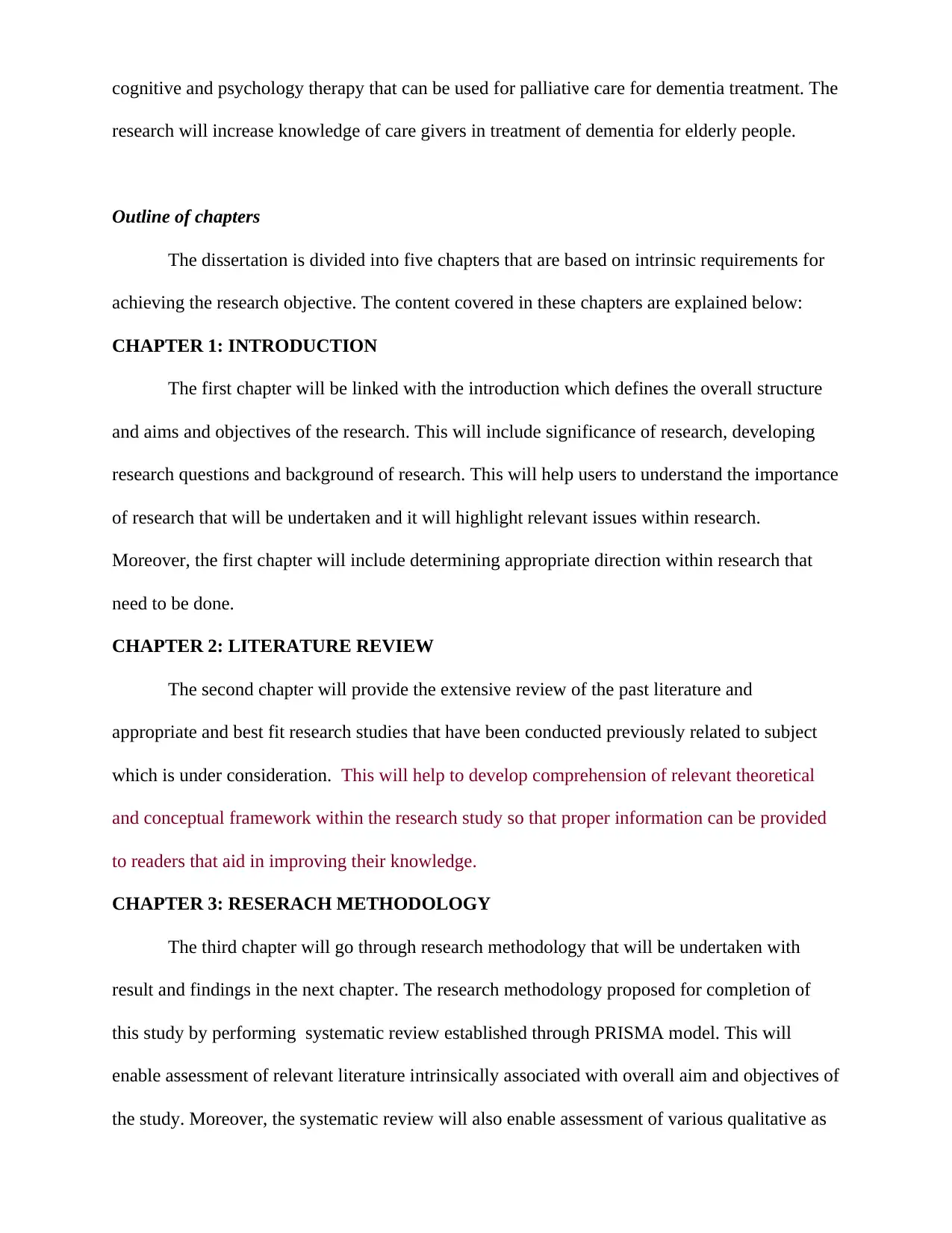
cognitive and psychology therapy that can be used for palliative care for dementia treatment. The
research will increase knowledge of care givers in treatment of dementia for elderly people.
Outline of chapters
The dissertation is divided into five chapters that are based on intrinsic requirements for
achieving the research objective. The content covered in these chapters are explained below:
CHAPTER 1: INTRODUCTION
The first chapter will be linked with the introduction which defines the overall structure
and aims and objectives of the research. This will include significance of research, developing
research questions and background of research. This will help users to understand the importance
of research that will be undertaken and it will highlight relevant issues within research.
Moreover, the first chapter will include determining appropriate direction within research that
need to be done.
CHAPTER 2: LITERATURE REVIEW
The second chapter will provide the extensive review of the past literature and
appropriate and best fit research studies that have been conducted previously related to subject
which is under consideration. This will help to develop comprehension of relevant theoretical
and conceptual framework within the research study so that proper information can be provided
to readers that aid in improving their knowledge.
CHAPTER 3: RESERACH METHODOLOGY
The third chapter will go through research methodology that will be undertaken with
result and findings in the next chapter. The research methodology proposed for completion of
this study by performing systematic review established through PRISMA model. This will
enable assessment of relevant literature intrinsically associated with overall aim and objectives of
the study. Moreover, the systematic review will also enable assessment of various qualitative as
research will increase knowledge of care givers in treatment of dementia for elderly people.
Outline of chapters
The dissertation is divided into five chapters that are based on intrinsic requirements for
achieving the research objective. The content covered in these chapters are explained below:
CHAPTER 1: INTRODUCTION
The first chapter will be linked with the introduction which defines the overall structure
and aims and objectives of the research. This will include significance of research, developing
research questions and background of research. This will help users to understand the importance
of research that will be undertaken and it will highlight relevant issues within research.
Moreover, the first chapter will include determining appropriate direction within research that
need to be done.
CHAPTER 2: LITERATURE REVIEW
The second chapter will provide the extensive review of the past literature and
appropriate and best fit research studies that have been conducted previously related to subject
which is under consideration. This will help to develop comprehension of relevant theoretical
and conceptual framework within the research study so that proper information can be provided
to readers that aid in improving their knowledge.
CHAPTER 3: RESERACH METHODOLOGY
The third chapter will go through research methodology that will be undertaken with
result and findings in the next chapter. The research methodology proposed for completion of
this study by performing systematic review established through PRISMA model. This will
enable assessment of relevant literature intrinsically associated with overall aim and objectives of
the study. Moreover, the systematic review will also enable assessment of various qualitative as
⊘ This is a preview!⊘
Do you want full access?
Subscribe today to unlock all pages.

Trusted by 1+ million students worldwide
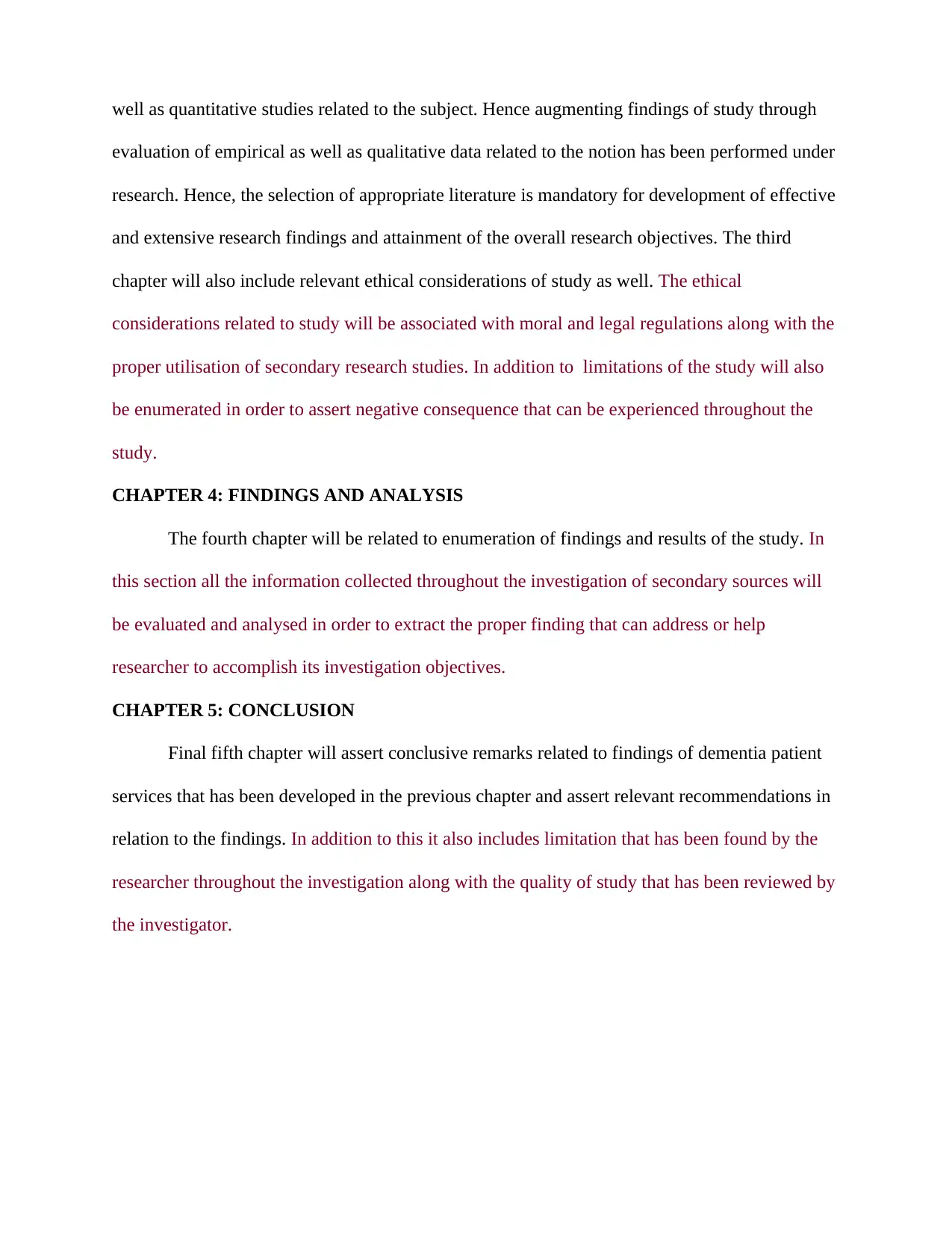
well as quantitative studies related to the subject. Hence augmenting findings of study through
evaluation of empirical as well as qualitative data related to the notion has been performed under
research. Hence, the selection of appropriate literature is mandatory for development of effective
and extensive research findings and attainment of the overall research objectives. The third
chapter will also include relevant ethical considerations of study as well. The ethical
considerations related to study will be associated with moral and legal regulations along with the
proper utilisation of secondary research studies. In addition to limitations of the study will also
be enumerated in order to assert negative consequence that can be experienced throughout the
study.
CHAPTER 4: FINDINGS AND ANALYSIS
The fourth chapter will be related to enumeration of findings and results of the study. In
this section all the information collected throughout the investigation of secondary sources will
be evaluated and analysed in order to extract the proper finding that can address or help
researcher to accomplish its investigation objectives.
CHAPTER 5: CONCLUSION
Final fifth chapter will assert conclusive remarks related to findings of dementia patient
services that has been developed in the previous chapter and assert relevant recommendations in
relation to the findings. In addition to this it also includes limitation that has been found by the
researcher throughout the investigation along with the quality of study that has been reviewed by
the investigator.
evaluation of empirical as well as qualitative data related to the notion has been performed under
research. Hence, the selection of appropriate literature is mandatory for development of effective
and extensive research findings and attainment of the overall research objectives. The third
chapter will also include relevant ethical considerations of study as well. The ethical
considerations related to study will be associated with moral and legal regulations along with the
proper utilisation of secondary research studies. In addition to limitations of the study will also
be enumerated in order to assert negative consequence that can be experienced throughout the
study.
CHAPTER 4: FINDINGS AND ANALYSIS
The fourth chapter will be related to enumeration of findings and results of the study. In
this section all the information collected throughout the investigation of secondary sources will
be evaluated and analysed in order to extract the proper finding that can address or help
researcher to accomplish its investigation objectives.
CHAPTER 5: CONCLUSION
Final fifth chapter will assert conclusive remarks related to findings of dementia patient
services that has been developed in the previous chapter and assert relevant recommendations in
relation to the findings. In addition to this it also includes limitation that has been found by the
researcher throughout the investigation along with the quality of study that has been reviewed by
the investigator.
Paraphrase This Document
Need a fresh take? Get an instant paraphrase of this document with our AI Paraphraser
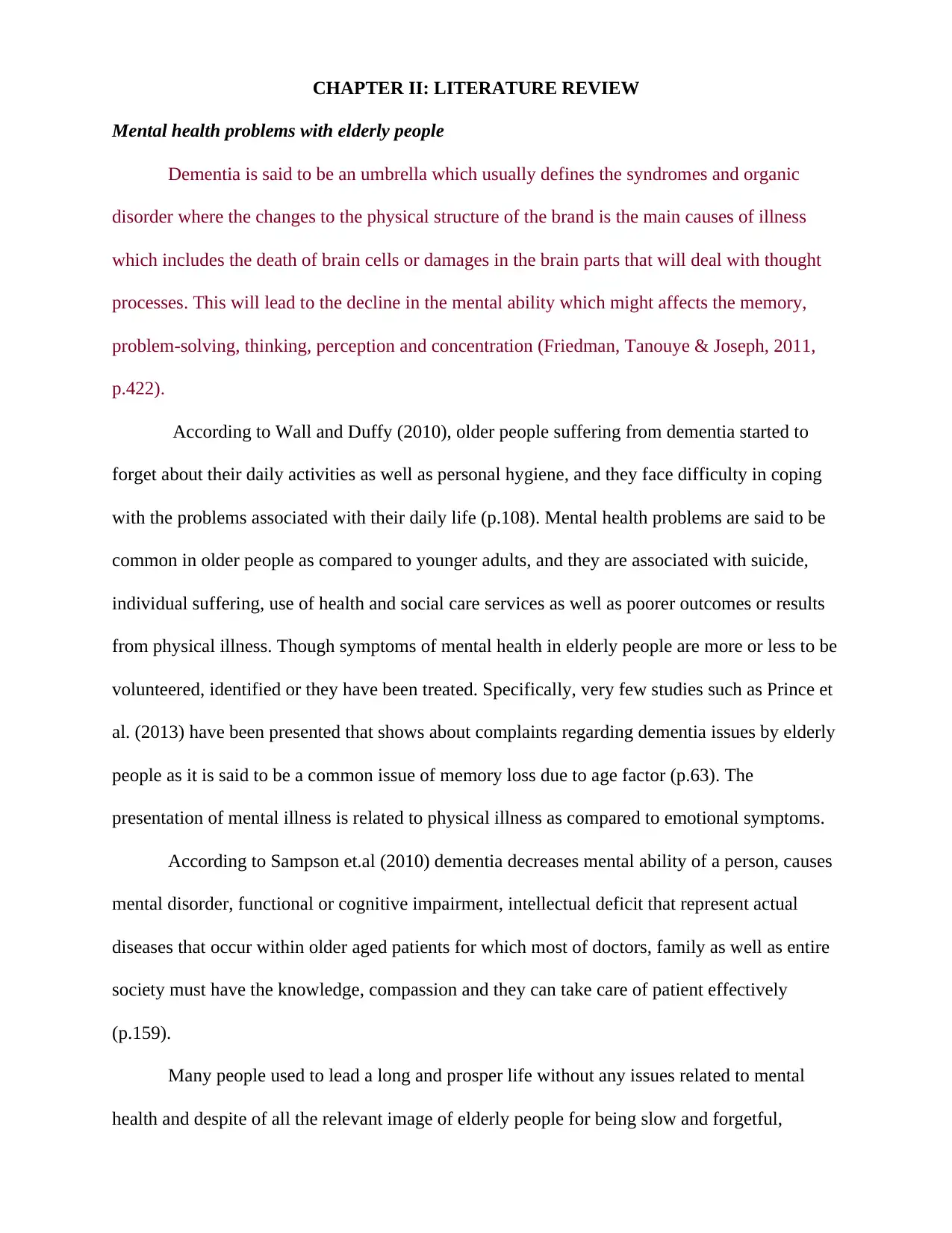
CHAPTER II: LITERATURE REVIEW
Mental health problems with elderly people
Dementia is said to be an umbrella which usually defines the syndromes and organic
disorder where the changes to the physical structure of the brand is the main causes of illness
which includes the death of brain cells or damages in the brain parts that will deal with thought
processes. This will lead to the decline in the mental ability which might affects the memory,
problem-solving, thinking, perception and concentration (Friedman, Tanouye & Joseph, 2011,
p.422).
According to Wall and Duffy (2010), older people suffering from dementia started to
forget about their daily activities as well as personal hygiene, and they face difficulty in coping
with the problems associated with their daily life (p.108). Mental health problems are said to be
common in older people as compared to younger adults, and they are associated with suicide,
individual suffering, use of health and social care services as well as poorer outcomes or results
from physical illness. Though symptoms of mental health in elderly people are more or less to be
volunteered, identified or they have been treated. Specifically, very few studies such as Prince et
al. (2013) have been presented that shows about complaints regarding dementia issues by elderly
people as it is said to be a common issue of memory loss due to age factor (p.63). The
presentation of mental illness is related to physical illness as compared to emotional symptoms.
According to Sampson et.al (2010) dementia decreases mental ability of a person, causes
mental disorder, functional or cognitive impairment, intellectual deficit that represent actual
diseases that occur within older aged patients for which most of doctors, family as well as entire
society must have the knowledge, compassion and they can take care of patient effectively
(p.159).
Many people used to lead a long and prosper life without any issues related to mental
health and despite of all the relevant image of elderly people for being slow and forgetful,
Mental health problems with elderly people
Dementia is said to be an umbrella which usually defines the syndromes and organic
disorder where the changes to the physical structure of the brand is the main causes of illness
which includes the death of brain cells or damages in the brain parts that will deal with thought
processes. This will lead to the decline in the mental ability which might affects the memory,
problem-solving, thinking, perception and concentration (Friedman, Tanouye & Joseph, 2011,
p.422).
According to Wall and Duffy (2010), older people suffering from dementia started to
forget about their daily activities as well as personal hygiene, and they face difficulty in coping
with the problems associated with their daily life (p.108). Mental health problems are said to be
common in older people as compared to younger adults, and they are associated with suicide,
individual suffering, use of health and social care services as well as poorer outcomes or results
from physical illness. Though symptoms of mental health in elderly people are more or less to be
volunteered, identified or they have been treated. Specifically, very few studies such as Prince et
al. (2013) have been presented that shows about complaints regarding dementia issues by elderly
people as it is said to be a common issue of memory loss due to age factor (p.63). The
presentation of mental illness is related to physical illness as compared to emotional symptoms.
According to Sampson et.al (2010) dementia decreases mental ability of a person, causes
mental disorder, functional or cognitive impairment, intellectual deficit that represent actual
diseases that occur within older aged patients for which most of doctors, family as well as entire
society must have the knowledge, compassion and they can take care of patient effectively
(p.159).
Many people used to lead a long and prosper life without any issues related to mental
health and despite of all the relevant image of elderly people for being slow and forgetful,
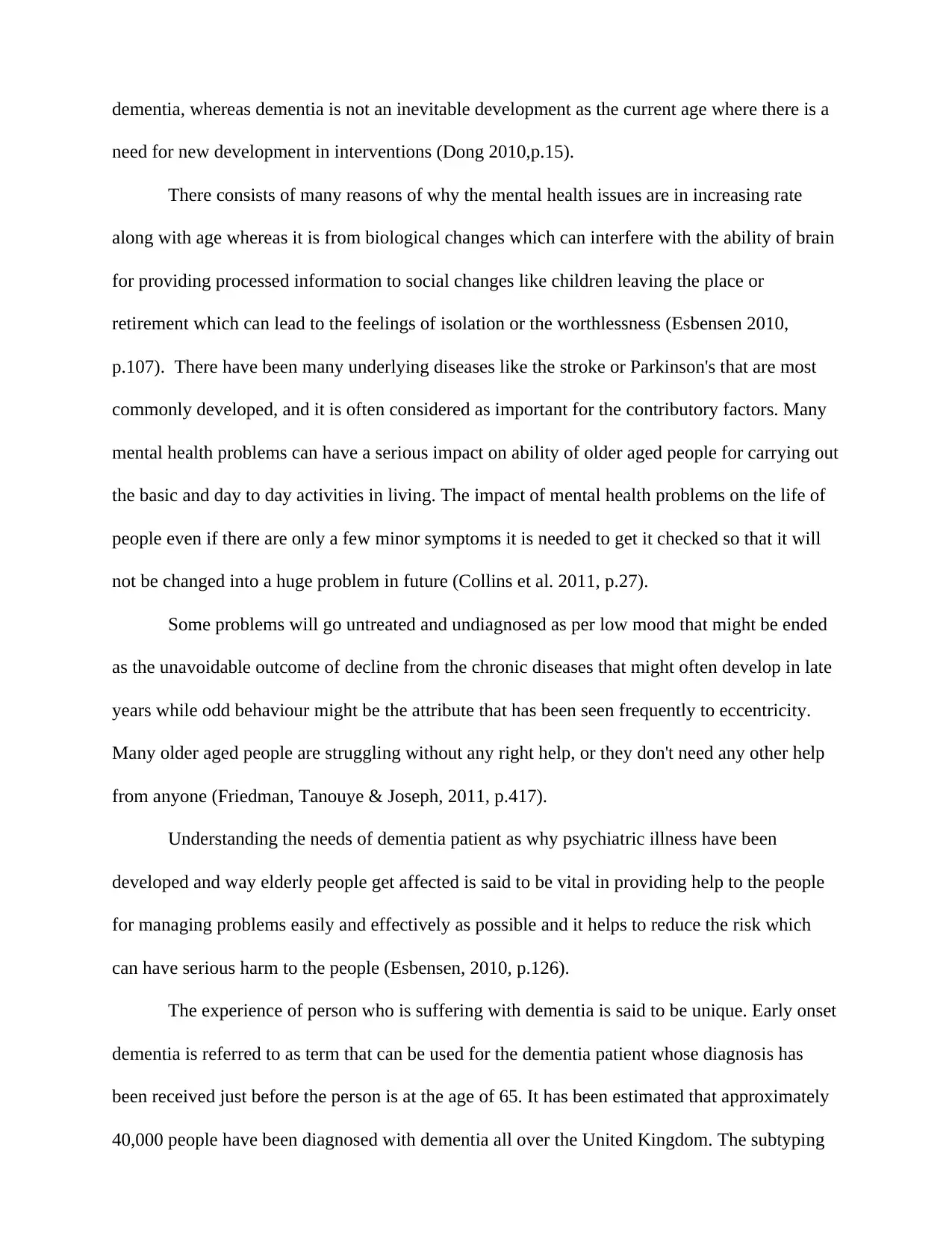
dementia, whereas dementia is not an inevitable development as the current age where there is a
need for new development in interventions (Dong 2010,p.15).
There consists of many reasons of why the mental health issues are in increasing rate
along with age whereas it is from biological changes which can interfere with the ability of brain
for providing processed information to social changes like children leaving the place or
retirement which can lead to the feelings of isolation or the worthlessness (Esbensen 2010,
p.107). There have been many underlying diseases like the stroke or Parkinson's that are most
commonly developed, and it is often considered as important for the contributory factors. Many
mental health problems can have a serious impact on ability of older aged people for carrying out
the basic and day to day activities in living. The impact of mental health problems on the life of
people even if there are only a few minor symptoms it is needed to get it checked so that it will
not be changed into a huge problem in future (Collins et al. 2011, p.27).
Some problems will go untreated and undiagnosed as per low mood that might be ended
as the unavoidable outcome of decline from the chronic diseases that might often develop in late
years while odd behaviour might be the attribute that has been seen frequently to eccentricity.
Many older aged people are struggling without any right help, or they don't need any other help
from anyone (Friedman, Tanouye & Joseph, 2011, p.417).
Understanding the needs of dementia patient as why psychiatric illness have been
developed and way elderly people get affected is said to be vital in providing help to the people
for managing problems easily and effectively as possible and it helps to reduce the risk which
can have serious harm to the people (Esbensen, 2010, p.126).
The experience of person who is suffering with dementia is said to be unique. Early onset
dementia is referred to as term that can be used for the dementia patient whose diagnosis has
been received just before the person is at the age of 65. It has been estimated that approximately
40,000 people have been diagnosed with dementia all over the United Kingdom. The subtyping
need for new development in interventions (Dong 2010,p.15).
There consists of many reasons of why the mental health issues are in increasing rate
along with age whereas it is from biological changes which can interfere with the ability of brain
for providing processed information to social changes like children leaving the place or
retirement which can lead to the feelings of isolation or the worthlessness (Esbensen 2010,
p.107). There have been many underlying diseases like the stroke or Parkinson's that are most
commonly developed, and it is often considered as important for the contributory factors. Many
mental health problems can have a serious impact on ability of older aged people for carrying out
the basic and day to day activities in living. The impact of mental health problems on the life of
people even if there are only a few minor symptoms it is needed to get it checked so that it will
not be changed into a huge problem in future (Collins et al. 2011, p.27).
Some problems will go untreated and undiagnosed as per low mood that might be ended
as the unavoidable outcome of decline from the chronic diseases that might often develop in late
years while odd behaviour might be the attribute that has been seen frequently to eccentricity.
Many older aged people are struggling without any right help, or they don't need any other help
from anyone (Friedman, Tanouye & Joseph, 2011, p.417).
Understanding the needs of dementia patient as why psychiatric illness have been
developed and way elderly people get affected is said to be vital in providing help to the people
for managing problems easily and effectively as possible and it helps to reduce the risk which
can have serious harm to the people (Esbensen, 2010, p.126).
The experience of person who is suffering with dementia is said to be unique. Early onset
dementia is referred to as term that can be used for the dementia patient whose diagnosis has
been received just before the person is at the age of 65. It has been estimated that approximately
40,000 people have been diagnosed with dementia all over the United Kingdom. The subtyping
⊘ This is a preview!⊘
Do you want full access?
Subscribe today to unlock all pages.

Trusted by 1+ million students worldwide
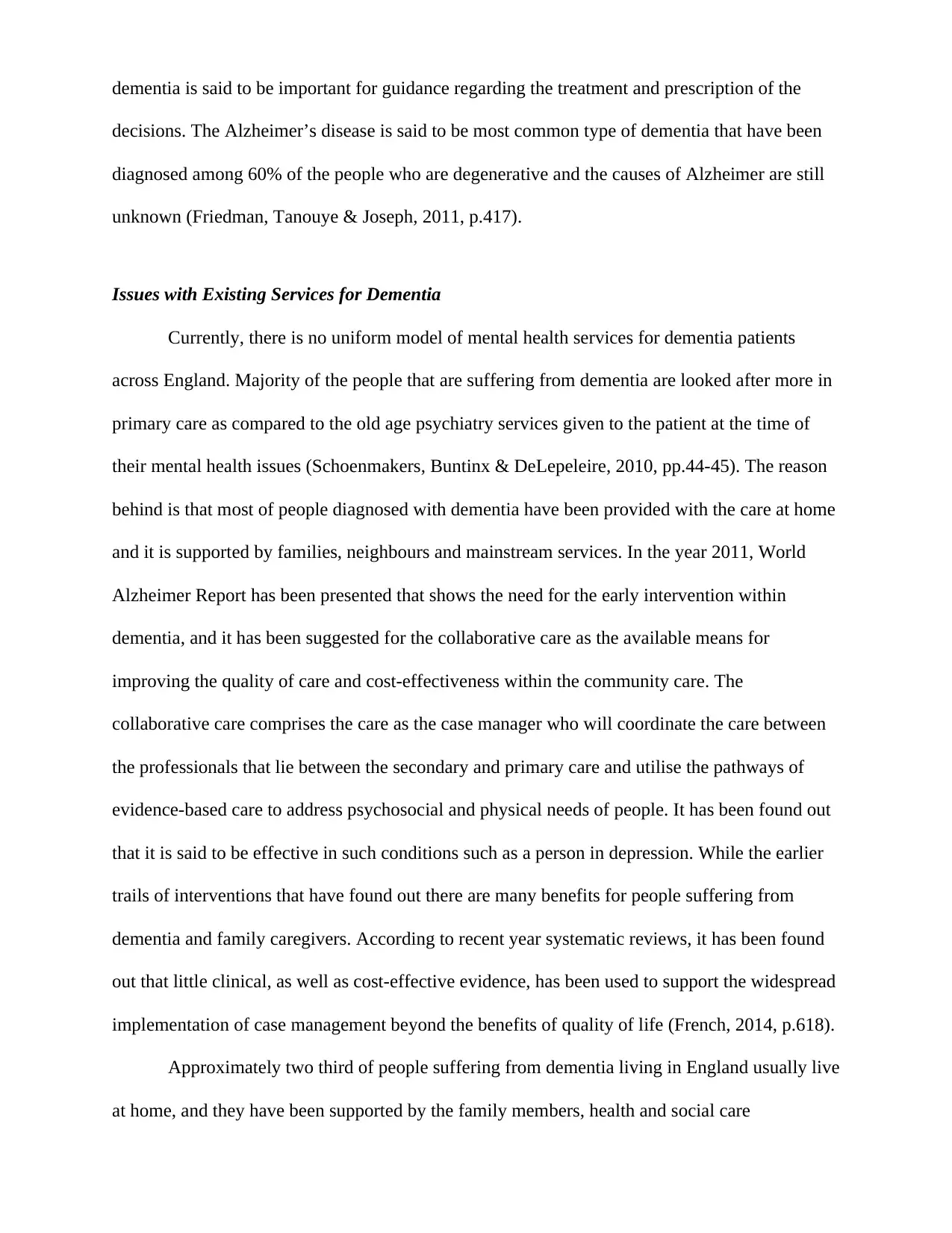
dementia is said to be important for guidance regarding the treatment and prescription of the
decisions. The Alzheimer’s disease is said to be most common type of dementia that have been
diagnosed among 60% of the people who are degenerative and the causes of Alzheimer are still
unknown (Friedman, Tanouye & Joseph, 2011, p.417).
Issues with Existing Services for Dementia
Currently, there is no uniform model of mental health services for dementia patients
across England. Majority of the people that are suffering from dementia are looked after more in
primary care as compared to the old age psychiatry services given to the patient at the time of
their mental health issues (Schoenmakers, Buntinx & DeLepeleire, 2010, pp.44-45). The reason
behind is that most of people diagnosed with dementia have been provided with the care at home
and it is supported by families, neighbours and mainstream services. In the year 2011, World
Alzheimer Report has been presented that shows the need for the early intervention within
dementia, and it has been suggested for the collaborative care as the available means for
improving the quality of care and cost-effectiveness within the community care. The
collaborative care comprises the care as the case manager who will coordinate the care between
the professionals that lie between the secondary and primary care and utilise the pathways of
evidence-based care to address psychosocial and physical needs of people. It has been found out
that it is said to be effective in such conditions such as a person in depression. While the earlier
trails of interventions that have found out there are many benefits for people suffering from
dementia and family caregivers. According to recent year systematic reviews, it has been found
out that little clinical, as well as cost-effective evidence, has been used to support the widespread
implementation of case management beyond the benefits of quality of life (French, 2014, p.618).
Approximately two third of people suffering from dementia living in England usually live
at home, and they have been supported by the family members, health and social care
decisions. The Alzheimer’s disease is said to be most common type of dementia that have been
diagnosed among 60% of the people who are degenerative and the causes of Alzheimer are still
unknown (Friedman, Tanouye & Joseph, 2011, p.417).
Issues with Existing Services for Dementia
Currently, there is no uniform model of mental health services for dementia patients
across England. Majority of the people that are suffering from dementia are looked after more in
primary care as compared to the old age psychiatry services given to the patient at the time of
their mental health issues (Schoenmakers, Buntinx & DeLepeleire, 2010, pp.44-45). The reason
behind is that most of people diagnosed with dementia have been provided with the care at home
and it is supported by families, neighbours and mainstream services. In the year 2011, World
Alzheimer Report has been presented that shows the need for the early intervention within
dementia, and it has been suggested for the collaborative care as the available means for
improving the quality of care and cost-effectiveness within the community care. The
collaborative care comprises the care as the case manager who will coordinate the care between
the professionals that lie between the secondary and primary care and utilise the pathways of
evidence-based care to address psychosocial and physical needs of people. It has been found out
that it is said to be effective in such conditions such as a person in depression. While the earlier
trails of interventions that have found out there are many benefits for people suffering from
dementia and family caregivers. According to recent year systematic reviews, it has been found
out that little clinical, as well as cost-effective evidence, has been used to support the widespread
implementation of case management beyond the benefits of quality of life (French, 2014, p.618).
Approximately two third of people suffering from dementia living in England usually live
at home, and they have been supported by the family members, health and social care
Paraphrase This Document
Need a fresh take? Get an instant paraphrase of this document with our AI Paraphraser
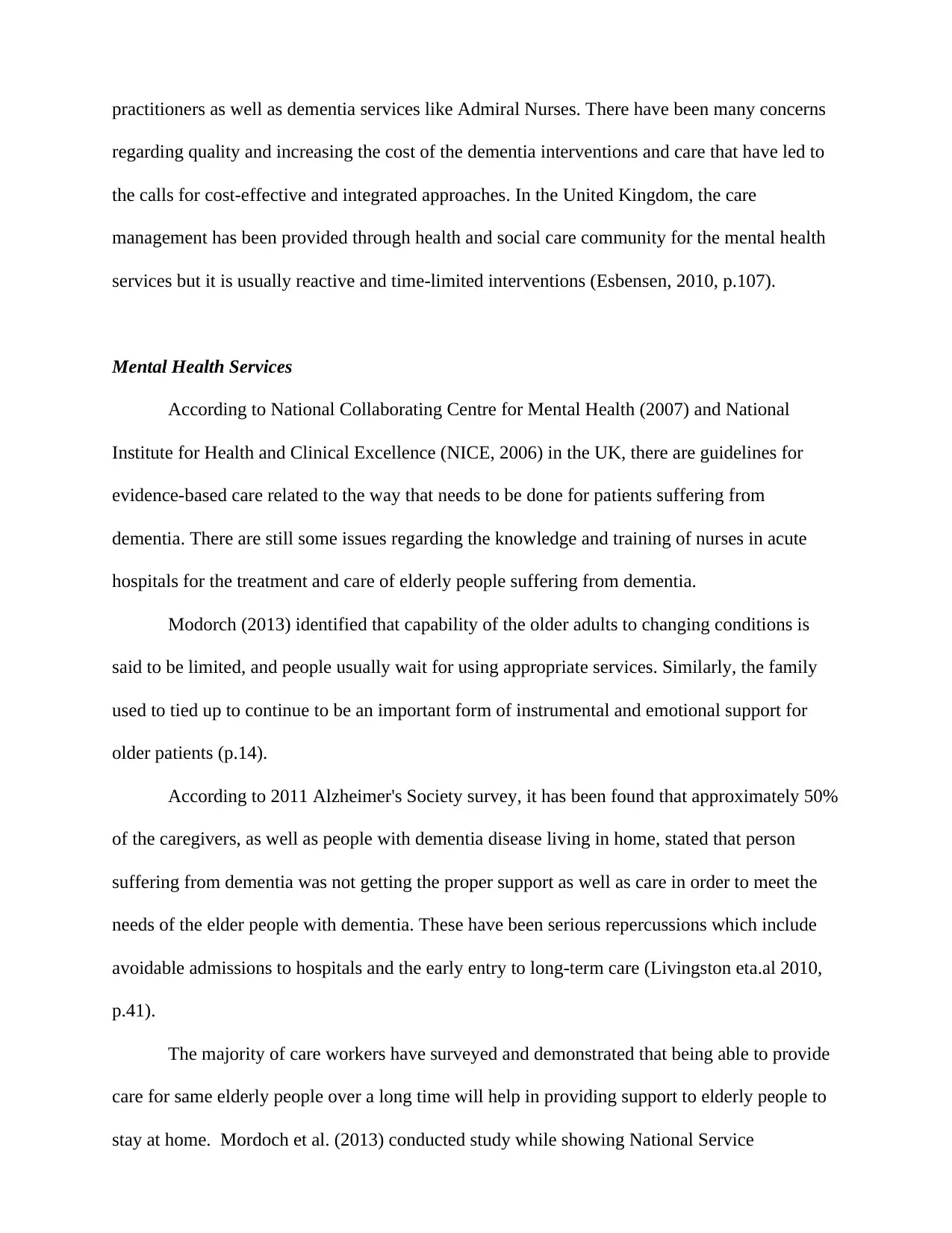
practitioners as well as dementia services like Admiral Nurses. There have been many concerns
regarding quality and increasing the cost of the dementia interventions and care that have led to
the calls for cost-effective and integrated approaches. In the United Kingdom, the care
management has been provided through health and social care community for the mental health
services but it is usually reactive and time-limited interventions (Esbensen, 2010, p.107).
Mental Health Services
According to National Collaborating Centre for Mental Health (2007) and National
Institute for Health and Clinical Excellence (NICE, 2006) in the UK, there are guidelines for
evidence-based care related to the way that needs to be done for patients suffering from
dementia. There are still some issues regarding the knowledge and training of nurses in acute
hospitals for the treatment and care of elderly people suffering from dementia.
Modorch (2013) identified that capability of the older adults to changing conditions is
said to be limited, and people usually wait for using appropriate services. Similarly, the family
used to tied up to continue to be an important form of instrumental and emotional support for
older patients (p.14).
According to 2011 Alzheimer's Society survey, it has been found that approximately 50%
of the caregivers, as well as people with dementia disease living in home, stated that person
suffering from dementia was not getting the proper support as well as care in order to meet the
needs of the elder people with dementia. These have been serious repercussions which include
avoidable admissions to hospitals and the early entry to long-term care (Livingston eta.al 2010,
p.41).
The majority of care workers have surveyed and demonstrated that being able to provide
care for same elderly people over a long time will help in providing support to elderly people to
stay at home. Mordoch et al. (2013) conducted study while showing National Service
regarding quality and increasing the cost of the dementia interventions and care that have led to
the calls for cost-effective and integrated approaches. In the United Kingdom, the care
management has been provided through health and social care community for the mental health
services but it is usually reactive and time-limited interventions (Esbensen, 2010, p.107).
Mental Health Services
According to National Collaborating Centre for Mental Health (2007) and National
Institute for Health and Clinical Excellence (NICE, 2006) in the UK, there are guidelines for
evidence-based care related to the way that needs to be done for patients suffering from
dementia. There are still some issues regarding the knowledge and training of nurses in acute
hospitals for the treatment and care of elderly people suffering from dementia.
Modorch (2013) identified that capability of the older adults to changing conditions is
said to be limited, and people usually wait for using appropriate services. Similarly, the family
used to tied up to continue to be an important form of instrumental and emotional support for
older patients (p.14).
According to 2011 Alzheimer's Society survey, it has been found that approximately 50%
of the caregivers, as well as people with dementia disease living in home, stated that person
suffering from dementia was not getting the proper support as well as care in order to meet the
needs of the elder people with dementia. These have been serious repercussions which include
avoidable admissions to hospitals and the early entry to long-term care (Livingston eta.al 2010,
p.41).
The majority of care workers have surveyed and demonstrated that being able to provide
care for same elderly people over a long time will help in providing support to elderly people to
stay at home. Mordoch et al. (2013) conducted study while showing National Service
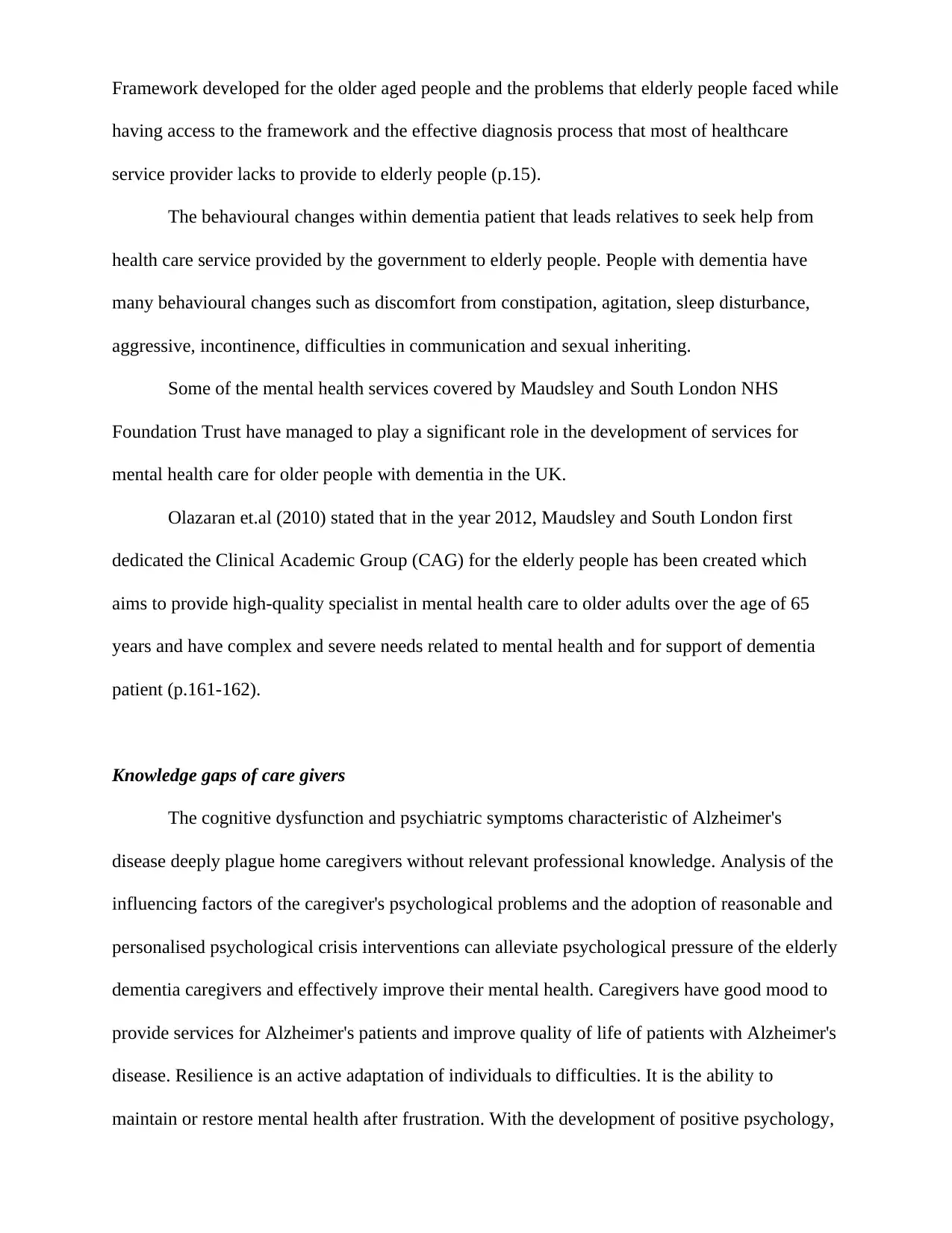
Framework developed for the older aged people and the problems that elderly people faced while
having access to the framework and the effective diagnosis process that most of healthcare
service provider lacks to provide to elderly people (p.15).
The behavioural changes within dementia patient that leads relatives to seek help from
health care service provided by the government to elderly people. People with dementia have
many behavioural changes such as discomfort from constipation, agitation, sleep disturbance,
aggressive, incontinence, difficulties in communication and sexual inheriting.
Some of the mental health services covered by Maudsley and South London NHS
Foundation Trust have managed to play a significant role in the development of services for
mental health care for older people with dementia in the UK.
Olazaran et.al (2010) stated that in the year 2012, Maudsley and South London first
dedicated the Clinical Academic Group (CAG) for the elderly people has been created which
aims to provide high-quality specialist in mental health care to older adults over the age of 65
years and have complex and severe needs related to mental health and for support of dementia
patient (p.161-162).
Knowledge gaps of care givers
The cognitive dysfunction and psychiatric symptoms characteristic of Alzheimer's
disease deeply plague home caregivers without relevant professional knowledge. Analysis of the
influencing factors of the caregiver's psychological problems and the adoption of reasonable and
personalised psychological crisis interventions can alleviate psychological pressure of the elderly
dementia caregivers and effectively improve their mental health. Caregivers have good mood to
provide services for Alzheimer's patients and improve quality of life of patients with Alzheimer's
disease. Resilience is an active adaptation of individuals to difficulties. It is the ability to
maintain or restore mental health after frustration. With the development of positive psychology,
having access to the framework and the effective diagnosis process that most of healthcare
service provider lacks to provide to elderly people (p.15).
The behavioural changes within dementia patient that leads relatives to seek help from
health care service provided by the government to elderly people. People with dementia have
many behavioural changes such as discomfort from constipation, agitation, sleep disturbance,
aggressive, incontinence, difficulties in communication and sexual inheriting.
Some of the mental health services covered by Maudsley and South London NHS
Foundation Trust have managed to play a significant role in the development of services for
mental health care for older people with dementia in the UK.
Olazaran et.al (2010) stated that in the year 2012, Maudsley and South London first
dedicated the Clinical Academic Group (CAG) for the elderly people has been created which
aims to provide high-quality specialist in mental health care to older adults over the age of 65
years and have complex and severe needs related to mental health and for support of dementia
patient (p.161-162).
Knowledge gaps of care givers
The cognitive dysfunction and psychiatric symptoms characteristic of Alzheimer's
disease deeply plague home caregivers without relevant professional knowledge. Analysis of the
influencing factors of the caregiver's psychological problems and the adoption of reasonable and
personalised psychological crisis interventions can alleviate psychological pressure of the elderly
dementia caregivers and effectively improve their mental health. Caregivers have good mood to
provide services for Alzheimer's patients and improve quality of life of patients with Alzheimer's
disease. Resilience is an active adaptation of individuals to difficulties. It is the ability to
maintain or restore mental health after frustration. With the development of positive psychology,
⊘ This is a preview!⊘
Do you want full access?
Subscribe today to unlock all pages.

Trusted by 1+ million students worldwide
1 out of 38
Related Documents
Your All-in-One AI-Powered Toolkit for Academic Success.
+13062052269
info@desklib.com
Available 24*7 on WhatsApp / Email
![[object Object]](/_next/static/media/star-bottom.7253800d.svg)
Unlock your academic potential
Copyright © 2020–2026 A2Z Services. All Rights Reserved. Developed and managed by ZUCOL.




